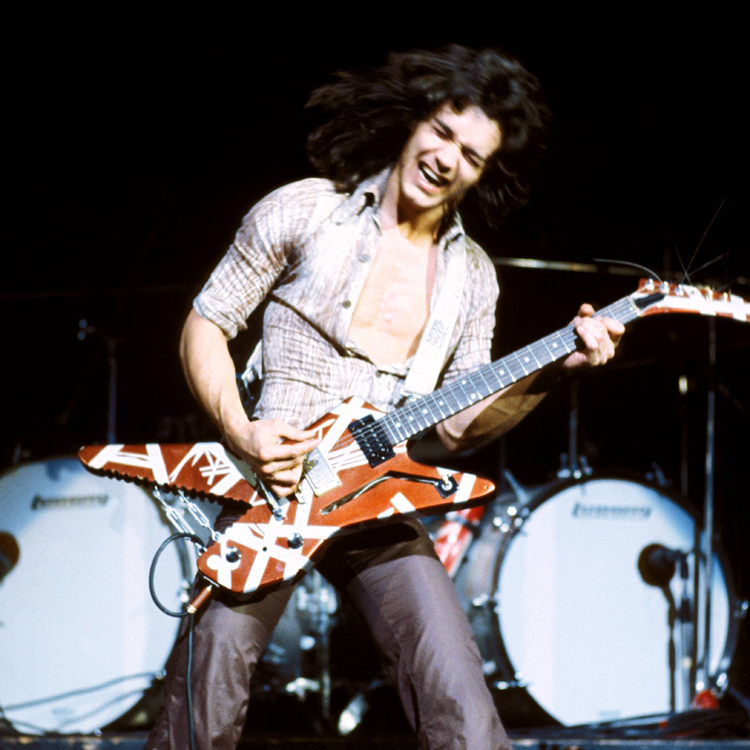
All the latest guitar news, interviews, lessons, reviews, deals and more, direct to your inbox!
You are now subscribed
Your newsletter sign-up was successful
He may have been the brains behind one of the most iconic electric guitars of all time – and one of the most well-known guitar modders in history – but Eddie Van Halen was also partial to putting his peers’ six-strings through their paces from time to time.
One such example was recently provided by W.A.S.P.’s Chris Holmes, who sat down on The Mitch Lafon and Jeremy White Show to reminisce about the time his close friend Van Halen asked to borrow his Ibanez Destroyer for an upcoming album he was recording.
It was a brand-for-brand swap, with Holmes receiving Van Halen’s heavily modded 1975 Ibanez Destroyer Shark model in return to keep him occupied until he was reunited with his own axe.
According to Holmes, Van Halen wanted to swap Destroyers as the tone and performance of his own had been drastically altered as a result of the many physical and functional tweaks it had received – which included cutting the body, drilling holes, replacing the bridge and adding turnbuckle hooks.
However, as Holmes explains, Van Halen couldn’t quite shake his affinity for radical Destroyer mods, and when the W.A.S.P. guitarist later came to retrieve his own example from Van Halen, he found it to be almost unrecognizable.
As Holmes recalls, “[Van Halen] goes, ‘Hey, I’m doing an album, another album, can I borrow your Ibanez?’ I go, ‘Yeah, yeah, it’s at home.’
“You know, I’m not gonna be playing for a few months here,” he continued. “So, I go, ‘Can you loan me one then, cause that’s the only one I got?’ He says ‘Okay,’ and I got to play the Shark guitar for a while. That actual one.
All the latest guitar news, interviews, lessons, reviews, deals and more, direct to your inbox!
“But he just borrowed mine. It was funny: when I went [to pick it up] he’d already split to hit the road, and I went over to his house, and his mom was there. I go, ‘Hey, is my guitar here Eddie borrowed?’ and his mom was like, ‘Go look in his room.’
“There were a few guitar cases. I go in there, I find my case, I opened it up, and there it was [laughs].”
What Holmes discovered was a Van Halen special – a mod job that made the W.A.S.P. founder question how Eddie had even been able to play the guitar in the state he had left it.

“The bridge was out, the pickup was out,” Holmes recalled. “And I was like... the bridge was off, and it was backwards. It was just, you know, the kind of bridges you just take off and put on. [It] didn’t have a whammy bar.
“It was like a Les Paul – you can take the bridge off and turn it around – but it was round backwards. I was looking at it, and I was like, ‘How in the eff did he play this?’”
Recognizing there must have been a method behind the madness, Holmes harbored no qualms over the mod job: “He probably… who knows what. It didn’t bother me, you know, I got it, it didn’t really bother me.”
In fact, Holmes was so unfazed by the whole experience, he didn’t even bother to ask Van Halen about his intentions behind the mod when he eventually saw him around six months later.
Nevertheless, it's safe to assume Holmes returned the guitar to its former glory, restoring the pickup that Van Halen had ripped out and switching the bridge back round so as to resemble a playable instrument once again.
The modded guitar proved to be mighty useful to Eddie Van Halen, though, and eventually made its way on to Women and Children First – Van Halen's third studio album – which arrived in 1980.
In February, Holmes announced he had been diagnosed with throat and neck cancer, and was set to undergo a seven-week recovery journey with the hopes of hitting the road later this year.
Speaking in an update on his Instagram in July, Holmes announced he had been given the all-clear from cancer, though he was still suffering the impacts of radiation treatment on his throat and neck.
To follow Holmes' updates, visit his Instagram page.

Matt is the GuitarWorld.com News Editor, and has been writing and editing for the site for five years. He has a Masters in the guitar, a degree in history, and has spent the last 19 years playing everything from blues and jazz to indie and pop. During his GW career, he’s interviewed Peter Frampton, Zakk Wylde, Tosin Abasi, Matteo Mancuso and more, and has profiled the CEOs of Guitar Center and Fender.
When he’s not combining his passion for writing and music during his day job, Matt performs with indie rock duo Esme Emerson, and has previously opened for the likes of Ed Sheeran, Keane, Japanese House and Good Neighbours.
